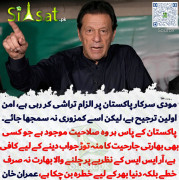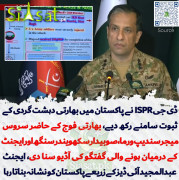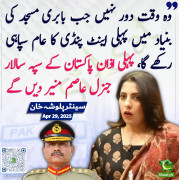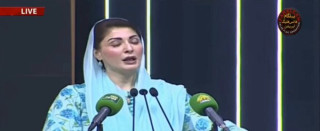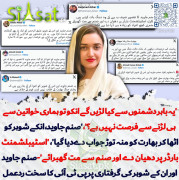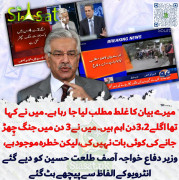mehwish_ali
Chief Minister (5k+ posts)
کسی کی دل شکنی مقصود نہیں، مگر روز روز اپنے اوپر لگنے والے بدعت کے فتوں سے بھی بیزار ہوں۔ اگر کہیں کوئی سخت بات بیچ میں آ گئی ہو تو بتلا دیجئے گا، میں اسے ایڈٹ کر دوں گی۔
سلفی برادران کا مسئلہ یہ ہے کہ یہ "ظاہر پرستی" کی بیماری کا شکار ہیں۔ اسی وجہ سے یہ بدعت کی شریعت میں "اصطلاحی"معنی کو رد کرتے ہوئے "ظاہری" معنوں کے پیچھے پڑ گئے ہیں، اور اس وجہ سے بُرے طریقے سے "تضادات" کا شکار ہیں۔
اس ظاہر پرستی کی وجہ سے انہوں نے اسلام میں "مباح" عباداتی افعال کو بھی بدعت و ضلالت بنا تے ہوئے اپنی نئی شریعت جاری کر دی ہے۔
اسلام میں "مباح" افعال کا تصور
مباح ایسے افعال ہیں جو شریعت کے کسی "بنیادی اصول" کے تحت جائز قرار پاتے ہیں، (اور اس کی کوئی شرط نہیں کہ قرآن و سنت میں انکا کوئی براہ راست حکم پہلے سے موجود ہو )۔ صحابہ کرام ایسے "نئے مباح " عباداتی افعال اپنے اجتہاد کی بنیاد پر انجام دیتے تھے اور رسول اللہ ﷺ نے کبھی ان نئے افعال پر بدعت و ضلالت کا فتویٰ جاری نہیں کیا۔ مثلاً:
صحیح مسلم، کتاب الذکر و الدعاء (آنلائن لنک)
یہ فتویٰ جاری کر کے سلفی برادران بذات خود بدعت و ضلالت کا شکار ہیں اور "حلال اللہ" کو اپنی طرف سے "حرام اللہ" بنا رہے ہیں (یعنی اللہ نے ایسے نیک مباح افعال کو اپنی شریعت میں حلال رکھا ہے، مگر یہ لوگ اپنی شریعت جاری کرتے ہوئے ان مباح افعال کو حرام بنا رہے ہیں)۔
ان میں سے کچھ جو واقعی جہل کا شکار ہیں انکا کا اگلا فتویٰ یہ آ جاتا ہے کہ "ذکر" صرف اللہ کے لیے مخصوص ہے ، چنانچہ رسول کا ذکر شرک ہے۔ حالانکہ انکے جہل کے برعکس اللہ نے قرآن میں بذات خود فرما دیا ہے کہ "رفعنا لک ذکرک" ۔۔۔ اے رسول میں (اللہ ) نے تمہارا ذکر بلند کیا ہے۔
اسلام میں کسی نئی سنتِ حسنہ یا نئی سنتِ سیئہ (بدعت) کا جاری کرنا
صحيح مسلم ، کتاب العلم ، (آنلائن لنک)
صحيح البخاري، کتاب الصلح:
صحابہ کرام نے اسی قانون پر عمل کرتے ہوئے، اپنے ذاتی اجتہاد اور رائے سے کئی نئےنیک مباح عباداتی افعال (سنتِ حسنہ) انجام دیے کہ جن کا نام لیکر رسول ﷺ نے انہیں کرنے کا کوئی حکم نہیں دیا تھا۔ مگر چونکہ وہ نئی چیزیں اس امر (دین) میں سے تھیں اور اس کے اصولوں کے مطابق تھیں، اس لیے جب رسول ﷺ کو ان نئے اور مباح عباداتی افعال کا پتا چلا تو آپ نے اس پر اُن کو اجرِ عظیم کی بشارت عطا فرمائی۔
اذان سے قبل درود پڑھنا بالمقابل حضرت بلالؓ کا اذان کے بعداپنی طرف سے دو رکعت نماز ادا کرنے کا رواج
اور سلفی برادران تو اذان سے قبل اور بعد میں رسول اللہ ﷺ پر صلوۃ (درو) پڑھنے کو بدعتِ ضلالۃ قرار دیتے ہیں، مگر ذیل میں حضرت بلالؓ کا فعل دیکھئے جہاں وہ اپنے اجتہاد کے مطابق اذان کے بعد دو رکعت نماز پڑھنے کا فعل اپنے اجتہاد کی بنیاد پر انجام دے رہے ہیں کیونکہ یہ ایک شریعت میں "مباح" عمل ہے۔ نیز وضو کرنے کے بعد بھی آپ اپنے ذاتی اجتہاد کے مطابق دو رکعت نماز پڑھتے تھے۔امام حاکم نے اس روایت کو شیخین (بخاری و مسلم) کی شرط پر صحیح قرار دیا ہے۔
مستدرک علی الصحیحین (آنلائن لنک)
1220 - أخبرنا أبو العباس القاسم بن القاسم السياري ، ثنا عبد الله بن علي الغزال ، ثنا علي بن الحسن بن شقيق ، ثنا الحسين بن واقد ، ثنا عبد الله بن بريدة ، عن أبيه ، قال : أصبح رسول الله - صلى الله عليه وآله وسلم - يوما ، فدعا بلالا ، فقال : " يا بلال بم سبقتني إلى الجنة ؟ إني [ ص: 621 ] دخلت البارحة الجنة فسمعت خشخشتك أمامي " . فقال بلال : يا رسول الله ، ما أذنت قط إلا صليت ركعتين ، وما أصابني حدث قط إلا توضأت عنده ، فقال رسول الله - صلى الله عليه وآله وسلم - : " بهذا " .
هذا حديث صحيح على شرط الشيخين ، ولم يخرجاه .
ترجمہ:
مزید حوالہ جات:
1۔ صحیح ابن خزیمہ (آنلائن لنک)
حضرت بلالؓ کی یہ روایت بخاری اور مسلم میں بھی موجود ہے جس میں حضرت بلال کا یہ اجتہاد درج ہے کہ وہ (وضو) کی پاکی حاصل کرنے کے بعد اپنے اجتہاد کے مطابق اتنی نماز پڑھتے تھے جتنی انکے مقدر میں لکھا ہوتا تھا۔
صحیح بخاری، حدیث نمبر: 1150 (آنلائن لنک)
امام ابن حجر العسقلانی (جن کاخلف محدثین میں وہی مقام ہے جو امام بخاری کا سلف محدثین میں) بخاری کی اس روایت کی شرح میں لکھتے ہیں (آنلائن لنک):
ويستفاد منه جواز الاجتهاد في توقيت العبادة، لأن بلالا توصل إلى ما ذكرنا بالاستنباط فصوبه النبي صلى الله عليه وسلم
ترجمہ:
صحابی کا اپنے اجتہاد کے مطابق نماز میں ذکر کے نئے کلمات ادا کرنا
صحیح بخاری، کتاب الاذان میں روایت درج ہے:
حدثنا عبد الله بن مسلمة عن مالك عن نعيم بن عبد الله المجمر عن علي بن يحيى بن خلاد الزرقي عن أبيه عن رفاعة بن رافع الزرقي قال كنا يوما نصلي وراء النبي صلى الله عليه وسلم فلما رفع رأسه من الركعة قال سمع الله لمن حمده قال رجل وراءه ربنا ولك الحمد حمدا كثيرا طيبا مباركا فيه فلما انصرف قال من المتكلم قال أنا قال رأيت بضعة وثلاثين ملكا يبتدرونها أيهم يكتبها أول
ترجمہ:
ابن حجر العسقلانی (جن کے علمِ حدیث کے سلفی برادران تک قائل ہیں اور انکی کتاب فتح الباری تمام سلفی مدارس میں پڑھائی جاتی ہے) اس حدیث کی شرح میں اپنی کتاب فتح الباری میں لکھتے ہیں:
واستدل به على جواز إحداث ذكر في الصلاة غير مأثور إذا كان مخالف للمأثور
ترجمہ:
اس صحابی نے اپنے اجتہاد سے ایک نیا فعل انجام دیا جو کہ مباح کے زمرے میں آتا ہے کیونکہ وہ قرآن و حدیث کے کسی اصول کے خلاف نہیں ہے۔ چنانچہ ایسے نئے افعال کو بدعت و ضلالت کہنا سلفی برادران کی سنت اور اپنی بنائی ہوئی شریعت تو ہو سکتی ہے مگر رسول اللہ ﷺ کی سنت یہ نہیں ہے۔
حضرت خبیب ؓ کی سنت، قتل ہونے سے قبل دو رکعت نماز پڑھنے کا رواج بننا
صحیح بخاری، کتاب الجہاد و السیر(آنلائن لنک):
سلفی برادران 30 راتوں تک باجماعت تراویح کیوں ادا کرتے ہیں؟
تراویح نماز ایک بہت نیک فعل ہے جس کا بہت بڑا اجر ہے۔ مگر:
یاد رکھیں، شریعت کو لے کر حضرت جبرئیل علیہ السلام صرف اور صرف رسول اللہ ﷺ کے پاس آتے تھے۔ یہ نہیں ہوا کہ شریعت کا کوئی حصہ کسی صحابی پر نازل کیا گیا ہو۔ اور جو خلفہ راشدین اور صحابہ کی سنت کی بات ہوتی ہے، اسکا مطلب ہوتا ہے کہ وہ صرف اور صرف رسول ﷺ کی سنت کی پیروی کر رہے ہوتے ہیں۔ چنانچہ صحابہ کرام نے اپنے اجتہاد کے مطابق اس "نئے مباح" عباداتی فعل کو 30 راتوں تک پھیلایا ہے کیونکہ اس میں کوئی قباحت نہیں، مگر سلفی برادران کی ظاہر پرستی کی بیماری کی وجہ سے بنائی گئی خود ساختہ شریعت میں ہر نیا مباح فعل بھی بدعت و ضلالت ہے۔
رمضان کی 30 راتوں پورے قرآن کو ختم کرنے کارواج
سلفی برادران سے ایک اور اہم سوال ہے کہ جسکا وہ کبھی جواب نہیں دیتے:
شبینہ بالمقابل تراویح
پاکستان میں اہلسنت مساجد میں ہر سال رمضان کے مہینے کی آخری راتوں میں شبینہ پڑھنے کا اہتمام ہوتا ہے جس میں قرآن پھر دوسری مرتبہ بھی ختم کیا جاتا ہے۔ مگر سلفی برادران اس پر بدعت و ضلالت کے فتوے لگاتے ہوئے الگ ہو جاتے ہیں اور انکا عذر ہوتا ہے کہ قرآن و سنت میں انہیں شبینہ کا وجود نہیں ملتا۔ مگر سلفی برادران کو دیکھنا چاہیے کہ اس لحاظ سے تو رمضان کی تیس راتوں میں تراویح کے دوران قرآن ختم کرنے کا حُکم بھی قرآن و سنت میں موجود نہیں ہے۔ یہ کیا ڈبل سٹینڈرڈز ہوئے کہ ایک نئے عمل کو تو آپ "عملِ صالح" قرار دے دیں جبکہ دوسرے نئے فعل کو بدعت کو ضلالت قرار دے دیں؟
اذان سے قبل درود پڑھنا بالمقابل صحابہ کے ناموں کے بعد "رضی اللہ عنہ" کہنا
سلفی برادران یہ فرمائیں کہ رسول اللہ ﷺ نے کب حکم فرمایا کہ بعد میں آنے والی مسلمان نسلیں صحابہ کے نام کے بعد "رضی اللہ عنہ" کہا کریں؟ نہ رسول ﷺ کے زمانے میں یہ رائج تھا، نہ صحابہ آپس میں ایک دوسرے کے ناموں کے بعد یہ کہتے تھے، نہ تابعین صحابہ کے ناموں کے بعد یہ کہتے تھے۔۔۔ بلکہ یہ بعد میں آنے والی مسلمان نسلیں تھیں جنہوں یہ نیا رواج اپنی طرف سے جاری کیا۔ تو اب اہلحدیث حضرات اس نئےاپنی طرف سے بنائے گئے رواج کو بدعت و ضلالت کیوں نہیں کہتے؟
اہلحدیث حضرات اس پر زیادہ سے زیادہ یہ بہانہ کرتے ہیں کہ اللہ بیعت رضوان میں صحابہ سے "راضی" ہوا تھا، اور اس نے اس پر آیت نازل فرمائی تھی۔
جواباً عرض ہے کہ اللہ نے اس آیت میں صرف یہ کہا ہے کہ وہ صرف اس "فعل" پر راضی ہوا کہ جب انہوں نے درخت کے نیچے بیعت کی۔ مگر اس آیت میں کہیں اللہ نے یہ حُکم نہیں دیا کہ صحابہ کے ناموں کے بعد "رضی اللہ عنہ" کہنے کا رواج جاری کر دو۔ رسول اللہﷺ قرآن کے سب سے بہترین شارح تھے، انہوں نے بھی یہ آیت پڑھی مگر کبھی اس نتیجے پر نہیں پہنچے جس پر آج اہلحدیث پہنچ رہے ہیں (یعنی صحابہ کے ناموں کے بعد رضی اللہ عنہ کہنا شروع کر دو)۔
اگلا سلفی بہانہ ہے کہ "رضی اللہ عنہ" ایک دعا ہے جو ہر وقت کی جا سکتی ہے۔
جواباً عرض ہے کہ جب ہم رسول ﷺ پر اذان سے قبل صلوۃ بھیج رہے ہوتے ہیں تو یہ بھی تو فقط دعا ہے۔ صلوۃ عربی کا لفظ ہے اور اسکے اپنے معنی "دعا" ہیں۔ یعنی جب ہم رسولﷺ پر صلوۃ بھیج رہے ہوتے ہیں تو اسکامطلب فقط یہ ہے کہ ہم اللہ سے رسولﷺ کے لیے دعا کر رہے ہوتے ہیں۔
تو کیا وجہ ہے کہ وہ دعا (صلوۃ) جس کی تعلیم خود اللہ نے دی، وہ پڑھنا بدعت و ضلات بن جاتی ہے، مگر صحابہ کے ناموں کے بعد آپ کی اپنی گھڑی ہوئی دعا کا رواج جاری کرنا بدعت و ضلالت نہیں بنتا ہے (بلکہ بلاشبہ یہ بدعت و ضلالت ہے کیونکہ آپ لوگوں نے اپنی طرف سے "رضی اللہ عنہ" کو صرف اور صرف صحابہ کے لیے مخصوص کر کے دوسروں کے لیے اسے پڑھنے کی ممانعت کر دی ہے۔ یہ نیا قانون جاری کر کے آپ شریعت ساز بن گئے ہیں اور یہ ہے اصل بدعت و ضلالت)۔
اللہ تعالی قرآن میں فرماتا ہے:
ام المومنین حضرت ام سلمہ اور اہل مدینہ کا رسول ﷺ کے بالوں سےنظرِ بد اور بیماری سے شفا حاصل کرنا
رسول ﷺ کی وفات کے بعد حضرت ام سلمہ (سلام اللہ علیہا) کے پاس رسول ﷺ کے چند بال تھے۔ اُنکا اور اہل مدینہ کا عمل یہ تھا کہ جب کوئی بیمار ہو جاتا تھا (یا کسی کو نظرِ بد لگ جاتی تھی) تو وہ ان بالوں سے مس شدہ پانی پیتا تھا تاکہ شفایاب ہو سکے۔ اب رسول ﷺ نے یہ نہیں فرمایا تھا کہ انکے وصال کے بعد یوں بیماری سے شفا حاصل کی جائے۔ مگر چونکہ یہ بات عام تھی کہ تبرکات نبوی میں برکت ہے، لہذا ام سلمہؑ اور اہل مدینہ اپنے اجتہاد سے یوں موئے مبارک کے ذریعے شفا حاصل کیا کرتے تھے۔
صحیح بخاری، کتاب اللباس:
حضرت انس کا اپنے اجتہاد سے موئے مبارک کو زبان کے نیچے رکھ کر دفن ہونا
علامہ ابن حجر العسقلانی، اپنی کتاب الاصابہ فی تمیز الصحابہ میں روایت نقل کرتے ہیں:
حضرت اسماء بنتِ ابی بکر کا اپنے اجتہاد سے رسول ﷺ کے جبے کے توسط سے شفا حاصل کرنا
صحیح مسلم، کتاب اللباس:
حضرت ابو ہریرہ کا نبی ﷺ کے پیالے سے برکت حاصل کرنا
صحیح بخاری، کتاب الاعتصام بالکتاب والسنۃ:
رسول ﷺ کے پیالے کے پانی کو سر پر چھڑکنا اور درود پڑھنا
اگر آج ہم اذان سے قبل درود پڑھ لیں تو بدعت و ضلالت کے فتوے شروع ہو جاتے ہیں۔ لیکن ادھر صحابہ کا طرز عمل دیکھئے جہاں وہ اپنے اجتہاد سے رسول ﷺ کے پیالے میں بھرے پانی کو اپنے سروں پر چھڑک رہے ہیں اور پھر درود پڑھ رہے ہیں۔
مسند احمد بن حنبل، جلد 3 ( لنک):
حضرت ثمامہ رضی اللہ عنہ سے روایت ہے کہ حضرت امِ سلیم کے پاس ایک شیشی میں حضور نبی اکرم صلی اللہ علیہ وآلہ وسلم کا مبارک پسینہ اور چند موئے مبارک محفوظ تھے حضرت انس رضی اللہ عنہ نے اپنے اجتہاد سے اپنے کفن میں اسی عرق رسول صلی اللہ علیہ وآلہ وسلم کو بطورِ خوشبو لگانے کی وصیت کی، حضرت ثمامہ کا بیان ہے :
صحیح بخاری، کتاب الاستئذان:
سلفی برادران کا مسئلہ یہ ہے کہ یہ "ظاہر پرستی" کی بیماری کا شکار ہیں۔ اسی وجہ سے یہ بدعت کی شریعت میں "اصطلاحی"معنی کو رد کرتے ہوئے "ظاہری" معنوں کے پیچھے پڑ گئے ہیں، اور اس وجہ سے بُرے طریقے سے "تضادات" کا شکار ہیں۔
اس ظاہر پرستی کی وجہ سے انہوں نے اسلام میں "مباح" عباداتی افعال کو بھی بدعت و ضلالت بنا تے ہوئے اپنی نئی شریعت جاری کر دی ہے۔
اسلام میں "مباح" افعال کا تصور
مباح ایسے افعال ہیں جو شریعت کے کسی "بنیادی اصول" کے تحت جائز قرار پاتے ہیں، (اور اس کی کوئی شرط نہیں کہ قرآن و سنت میں انکا کوئی براہ راست حکم پہلے سے موجود ہو )۔ صحابہ کرام ایسے "نئے مباح " عباداتی افعال اپنے اجتہاد کی بنیاد پر انجام دیتے تھے اور رسول اللہ ﷺ نے کبھی ان نئے افعال پر بدعت و ضلالت کا فتویٰ جاری نہیں کیا۔ مثلاً:
صحیح مسلم، کتاب الذکر و الدعاء (آنلائن لنک)
سیدنا ابو سعید خدریؓ کہتے ہیں کہ سیدنا معاویہؓ نے مسجد میں (لوگوں کا) ایک حلقہ دیکھا تو پوچھا کہ تم لوگ یہاں کیوں بیٹھے ہو؟ وہ بولے کہ ہم اللہ تعالیٰ کا ذکر کرنے بیٹھے ہیں۔ سیدنا معاویہؓ نے کہا اللہ کی قسم! کیا تم اسی لئے بیٹھے ہو؟ انہوں نے کہا کہ اللہ کی قسم! صرف اللہ کے ذکر کے لئے بیٹھے ہیں۔ سیدنا معاویہؓ نے کہا کہ میں نے تمہیں اس لئے قسم نہیں دی کہ تمہیں جھوٹا سمجھا اور میرا رسول اللہﷺ کے پاس جو مرتبہ تھا، اس رتبہ کے لوگوں میں کوئی مجھ سے کم حدیث کا روایت کرنے والا نہیں ہے (یعنی میں سب لوگوں سے کم حدیث روایت کرتا ہوں)۔ ایک دفعہ رسول اللہﷺ اپنے اصحاب کے حلقہ پر نکلے اور پوچھا کہ تم کیوں بیٹھے ہو؟ وہ بولے کہ ہم اللہ جل و علا کی یاد کرنے کو بیٹھے ہیں اور اس کی تعریف کرتے ہیں اور شکر کرتے ہیں کہ اس نے ہمیں اسلام کی راہ بتلائی اور ہمارے اوپر احسان کیا۔ آپﷺ نے فرمایا، اللہ تعالیٰ کی قسم! تم اسی لئے بیٹھے ہو؟ وہ بولے کہ اللہ کی قسم! ہم تو صرف اسی واسطے بیٹھے ہیں۔ آپﷺ نے فرمایا کہ میں نے تمہیں اس لئے قسم نہیں دی کہ تمہیں جھوٹا، سمجھا بلکہ میرے پاس جبرئیل علیہ السلام آئے اور بیان کیا کہ اللہ تعالیٰ تمہاری وجہ سے فرشتوں میں فخر کر رہا ہے۔
چنانچہ ثابت ہوا کہ:- یہ صحابہ کرام اپنی مرضی سے" محفلِ ذکر" بنا کر اللہ کی "حمد" کر رہے تھے۔
- اللہ کے رسول نے انہیں ایسا کرنے کا براہ راست کوئی حکم نہیں دیا تھا، بلکہ یہ صحابہ کرام کا اپنا اجتہاد تھا کہ بنیادی اصول اللہ کا ذکر کرنا ہے اور اسکا طریقہ یعنی محفل بنا کر ذکر کرنا عین مباح فعل ہے اور اسلام کی کسی بنیادی اصول سے نہیں ٹکراتا ہے۔
- اس ذکر کی محفل کے "وقت" کا تعین بھی ان صحابہ نے اپنی مرضی سے کیا تھا کیونکہ انہیں علم تھا کہ شریعت کا کوئی ایسا اصول نہیں ہے جو ایسے اوقات میں ذکر کی محفل کرنے کو حرام ٹہراتا ہے۔
- اور جب اللہ کے رسول ﷺ کو صحابہ کرام کے اس نئے مباح عباداتی فعل کا علم ہوتا ہے تو آپ ﷺ اس پر بدعت و ضلالت کا فتویٰ لگانے کی بجائے ان صحابہ کرام کو فرماتے ہیں کہ اللہ تعالی انکے اس "نئے فعل" کی وجہ سے فرشتوں میں فخر کر رہا ہے۔
یہ فتویٰ جاری کر کے سلفی برادران بذات خود بدعت و ضلالت کا شکار ہیں اور "حلال اللہ" کو اپنی طرف سے "حرام اللہ" بنا رہے ہیں (یعنی اللہ نے ایسے نیک مباح افعال کو اپنی شریعت میں حلال رکھا ہے، مگر یہ لوگ اپنی شریعت جاری کرتے ہوئے ان مباح افعال کو حرام بنا رہے ہیں)۔
ان میں سے کچھ جو واقعی جہل کا شکار ہیں انکا کا اگلا فتویٰ یہ آ جاتا ہے کہ "ذکر" صرف اللہ کے لیے مخصوص ہے ، چنانچہ رسول کا ذکر شرک ہے۔ حالانکہ انکے جہل کے برعکس اللہ نے قرآن میں بذات خود فرما دیا ہے کہ "رفعنا لک ذکرک" ۔۔۔ اے رسول میں (اللہ ) نے تمہارا ذکر بلند کیا ہے۔
اسلام میں کسی نئی سنتِ حسنہ یا نئی سنتِ سیئہ (بدعت) کا جاری کرنا
صحيح مسلم ، کتاب العلم ، (آنلائن لنک)
جابر بن عبداللہ انصاری روایت کرتے ہیں کہ کچھ عربی بدو رسول اللہ ﷺ کے پاس آئے۔آپ ﷺ نے جب ان کو بری حالت میں دیکھا تو لوگوں کو کہا کہ اُن کو کچھ خیرات وغیرہ دیں، مگر لوگوں نے کچھ ہچکچاہٹ کا مظاہرہ کیا، حتیٰ کہ رسول ﷺ کے چہرہ پر غصے کے آثار نمودار ہو گئے۔ پھر انصار میں سے ایک شخص اٹھا اور چاندی کے سکے دیے۔ پھر ایک اور شخص آیا اور پھر دوسرے لوگوں نے بھی اِس کام میں اُن کی پیروی کی، حتیٰ کہ رسول ﷺ کے چہرہ پر خوشی کے آثار نمودار ہو گئے۔ پھر رسول ﷺ نے فرمایا:اگر کسی شخص نے اسلام میں کسی سنتِ حسنہ کو متعارف کروایا، اور پھر دوسرے لوگوں نے بھی اس کی پیروی کی، تو اُس کو اُن لوگوں کے اجر کا ثواب بھی ملے اور اُن لوگوں کے اپنے ثواب میں بھی کوئی کمی نہ ہو گی۔ اور اگر کسی شخص نے اسلام میں کسی سنتِ سئیہ کو متعارف کروایا، اور دوسرے لوگوں نے بھی اس کی پیروی کی، تو اُس کو اُن لوگوں کا بھی گناہ ملے گا، اور اُن لوگوں کے اپنے گناہ میں بھی کوئی کمی نہ ہو گی۔
چنانچہ:- ہر وہ نیا عمل، جو کہ دین کے اصولوں کے مطابق ہے اور اس کی تقویت کا باعث ہے، وہ سنتِ حسنہ کہلائے گا۔(سلفی برادران اسکو صرف خیرات تک محدود کر دیتے ہیں جو کہ غلط ہے۔ آگے صحابہ کرام کے مزید واقعات پیش ہوں گے جہاں انہوں نے نئے مباح عباداتی افعال کیے اور رسول ﷺ نے اس پر بدعت و ضلالت کے فتوے نہیں لگائے بلکہ اس پر خوش ہوئے)
- اور ہر وہ نیا عمل، جو کہ دین کے اصولوں کے خلاف ہے اور اس کی بربادی کا باعث ہے، وہ سنتِ سئیہ یا پھر بدعتِ ضلالت (گمراہی) کہلائے گا۔
صحيح البخاري، کتاب الصلح:
حضرت عائشہ روایت کرتی ہیں کہ رسول ﷺ نے فرمایا:جس نے اس امر (دین) میں ایسی نئی چیز کا اضافہ کیا جو کہ اس (امر) میں سے نہیں ہے، وہ چیز مردود ہے۔
پس رسول اللہ ﷺ نے ہر نئی چیز کو مردود نہیں قرار دیا، بلکہ صرف اُن نئی چیزوں کو مردود قرار دیا ہے جو اس امر (دین) میں سے نہیں ہیں، یعنی جو دین کے اصولوں کے مطابق نہیں ہیں۔اور ایسی تمام نئی چیزیں، جو اس امر (دین) سے ہیں (یعنی جن کی اصل دین میں پائی جاتی ہے اور جو دین کے اصولوں کے عین مطابق ہیں)، وہ مردود نہیں ہیں۔ صحابہ کرام نے اسی قانون پر عمل کرتے ہوئے، اپنے ذاتی اجتہاد اور رائے سے کئی نئےنیک مباح عباداتی افعال (سنتِ حسنہ) انجام دیے کہ جن کا نام لیکر رسول ﷺ نے انہیں کرنے کا کوئی حکم نہیں دیا تھا۔ مگر چونکہ وہ نئی چیزیں اس امر (دین) میں سے تھیں اور اس کے اصولوں کے مطابق تھیں، اس لیے جب رسول ﷺ کو ان نئے اور مباح عباداتی افعال کا پتا چلا تو آپ نے اس پر اُن کو اجرِ عظیم کی بشارت عطا فرمائی۔
اذان سے قبل درود پڑھنا بالمقابل حضرت بلالؓ کا اذان کے بعداپنی طرف سے دو رکعت نماز ادا کرنے کا رواج
اور سلفی برادران تو اذان سے قبل اور بعد میں رسول اللہ ﷺ پر صلوۃ (درو) پڑھنے کو بدعتِ ضلالۃ قرار دیتے ہیں، مگر ذیل میں حضرت بلالؓ کا فعل دیکھئے جہاں وہ اپنے اجتہاد کے مطابق اذان کے بعد دو رکعت نماز پڑھنے کا فعل اپنے اجتہاد کی بنیاد پر انجام دے رہے ہیں کیونکہ یہ ایک شریعت میں "مباح" عمل ہے۔ نیز وضو کرنے کے بعد بھی آپ اپنے ذاتی اجتہاد کے مطابق دو رکعت نماز پڑھتے تھے۔امام حاکم نے اس روایت کو شیخین (بخاری و مسلم) کی شرط پر صحیح قرار دیا ہے۔
مستدرک علی الصحیحین (آنلائن لنک)
1220 - أخبرنا أبو العباس القاسم بن القاسم السياري ، ثنا عبد الله بن علي الغزال ، ثنا علي بن الحسن بن شقيق ، ثنا الحسين بن واقد ، ثنا عبد الله بن بريدة ، عن أبيه ، قال : أصبح رسول الله - صلى الله عليه وآله وسلم - يوما ، فدعا بلالا ، فقال : " يا بلال بم سبقتني إلى الجنة ؟ إني [ ص: 621 ] دخلت البارحة الجنة فسمعت خشخشتك أمامي " . فقال بلال : يا رسول الله ، ما أذنت قط إلا صليت ركعتين ، وما أصابني حدث قط إلا توضأت عنده ، فقال رسول الله - صلى الله عليه وآله وسلم - : " بهذا " .
هذا حديث صحيح على شرط الشيخين ، ولم يخرجاه .
ترجمہ:
''اور حضرت بریدہ فرماتے ہیں کہ ایک دن رسول اللہ صلی اللہ علیہ وسلم نے صبح کے وقت فجر کی نماز کے بعد حضرت بلال کو طلب کیا اور (جب وہ خدمت اقدس میں حاضر ہوئے تو آپ صلی اللہ علیہ وسلم نے ان سے فرمایا کہ 'کس عمل کے ذریعے تم نے جنت میں مجھ سے پیش روی اختیار کی ہے (کیونکہ) میں جب بھی جنت میں داخل ہوا تو اپنے آگے آگے تمہارے جوتوں کی آواز سنی؟ انہوں نے عرض کیا کہ ''یا رسول اﷲ ( صلی اللہ علیہ وسلم) ! میں نے جب بھی اذان دی ہے تو اس کے بعد دو رکعت نماز (ضرور) پڑھی ہے اور جب بھی میرا وضو ٹوٹا ہے میں نے اسی وقت وضو کر لیا اور میں نے اللہ کے واسطے دو رکعت نماز پڑھنی ضروری سمجھا ہے۔ (یعنی ہر وضو کے بعد پابندی کے ساتھ نماز پڑھنی میں نے اپنے اوپر لازم قرار دے رکھی ہے) رسول اللہ صلی اللہ علیہ وسلم نے (یہ سن کر) فرمایا کہ ''اسی وجہ سے تم اس عظیم درجہ کو پہنچے ہو۔''
(امام حاکم فرماتے ہیں) یہ روایت شیخین (بخاری و مسلم) کی شرائط کے مطابق "صحیح"حدیث ہے۔
مزید حوالہ جات:
1۔ صحیح ابن خزیمہ (آنلائن لنک)
حضرت بلالؓ کی یہ روایت بخاری اور مسلم میں بھی موجود ہے جس میں حضرت بلال کا یہ اجتہاد درج ہے کہ وہ (وضو) کی پاکی حاصل کرنے کے بعد اپنے اجتہاد کے مطابق اتنی نماز پڑھتے تھے جتنی انکے مقدر میں لکھا ہوتا تھا۔
صحیح بخاری، حدیث نمبر: 1150 (آنلائن لنک)
ہم سے اسحاق بن نصر نے بیان کیا کہا ہم سے ابواسامہ حماد بن اسامہ نے انہوں نے ابو حیان یحیٰی بن سعید سے انہوں نے ابو زرعہ ہرم بن جریر سے انہوں نے ابو ہریرہؓ سے کہ نبیﷺ نے صبح کی نماز کے وقت بلالؓ سے فرمایا بلالؓ مجھ سے کہہ تو نے اسلام کے زمانے میں سب سے زیادہ امید کا کونسا نیک کام کیا ہے۔ کیونکہ میں نے بہشت میں اپنے آگے تیرے جوتوں کی پھٹ پھٹ کی آواز سنی۔ بلالؓ نے عرض کیا میں نے تو اپنے نزدیک اس سے زیادہ امید کا کوئی کام نہیں کیا کہ جب میں نے رات یا دن کسی وقت بھی وضو کیا تو میں اس وضو سے (نفل) نماز پڑھتا رہا جتنی میری تقدیر میں لکھی تھی۔
امام ابن حجر العسقلانی (جن کاخلف محدثین میں وہی مقام ہے جو امام بخاری کا سلف محدثین میں) بخاری کی اس روایت کی شرح میں لکھتے ہیں (آنلائن لنک):
ويستفاد منه جواز الاجتهاد في توقيت العبادة، لأن بلالا توصل إلى ما ذكرنا بالاستنباط فصوبه النبي صلى الله عليه وسلم
ترجمہ:
اس حدیث میں جواز ہے کہ عبادات کے اوقات کے لیے انسان ذاتی اجتہاد کو استعمال کر سکتا ہے، کیونکہ بلالؓ اپنے استنباط کے تحت اس عمل کو کر رہے تھے اور رسول اللہ ﷺ نے (بعد میں پتا چلنے پر) انکی تائید کی۔
چنانچہ سلفی برادران جو ہم پر اذان سے قبل اور بعد میں درود بھیجنے پر بدعت و ضلالت کے فتوے لگاتے ہیں، وہ دیکھ لیں کہ حضرت بلالؓ اپنے ذاتی اجتہاد سے اذان دینے کے بعد دو رکعت نماز ادا کرتے تھے اور اسی طرح وضو کرنے کے بعد بھی ہمیشہ اپنے اجتہاد کے مطابق نفل نماز ادا کرتے تھے۔
صحابی کا اپنے اجتہاد کے مطابق نماز میں ذکر کے نئے کلمات ادا کرنا
صحیح بخاری، کتاب الاذان میں روایت درج ہے:
حدثنا عبد الله بن مسلمة عن مالك عن نعيم بن عبد الله المجمر عن علي بن يحيى بن خلاد الزرقي عن أبيه عن رفاعة بن رافع الزرقي قال كنا يوما نصلي وراء النبي صلى الله عليه وسلم فلما رفع رأسه من الركعة قال سمع الله لمن حمده قال رجل وراءه ربنا ولك الحمد حمدا كثيرا طيبا مباركا فيه فلما انصرف قال من المتكلم قال أنا قال رأيت بضعة وثلاثين ملكا يبتدرونها أيهم يكتبها أول
ترجمہ:
ہم سے عبد اللہ بن مسلمہ قعنبی نے بیان کیا انہوں نے امام مالک سے انہوں نے نعیم بن عبد اللہ مجمر سے انہوں نے علی بن یحییٰ بن خلاد زرقی سے انہوں نے اپنے باپ یحییٰ بن خلاد سے انہوں نے رفاعہ بن رافع زرقی صحابی سے انہوں نے کہا ہم ایک دن نبیﷺکے پیچھے نماز پڑھ رہے تھے جب آپ نے رکوع سے سر اٹھایا تو فرمایا سمع اللہ لمن حمدہ ۔ایک شخص نے آپ کے پیچھے یہ (نئے) کلمات کہے" ربنا ولک الحمد حمدًا کثیرًا طیِّباً مبارکاً فیہ" جب آپ نماز پڑھ چکے تو پوچھا ۔یہ کلام کس نے کیا تھا وہ شخص بولا میں نے آپ نے فرمایا میں نے کچھ اوپر تیس فرشتوں کو دیکھا ہر ایک لپک رہا تھا کون پہلے اس کو لکھتا ہے ۔
حوالہ: صحیح بخاری، کتاب الاذان ، حدیث نمبر 800 (آنلائن لنک)
ابن حجر العسقلانی (جن کے علمِ حدیث کے سلفی برادران تک قائل ہیں اور انکی کتاب فتح الباری تمام سلفی مدارس میں پڑھائی جاتی ہے) اس حدیث کی شرح میں اپنی کتاب فتح الباری میں لکھتے ہیں:
واستدل به على جواز إحداث ذكر في الصلاة غير مأثور إذا كان مخالف للمأثور
ترجمہ:
"اس حدیث میں ثبوت ہے کہ صلوۃ میں ذکر کے ایسے نئے کلمات ادا کیے جا سکتے ہیں جو کہ حدیث سے نہ بھی پہنچے ہوں، تاوقتیکہ وہ کسی حدیث کے مخالف نہ ہوں۔"
حوالہ: فتح الباری (آنلائن لنک)
اس صحابی نے اپنے اجتہاد سے ایک نیا فعل انجام دیا جو کہ مباح کے زمرے میں آتا ہے کیونکہ وہ قرآن و حدیث کے کسی اصول کے خلاف نہیں ہے۔ چنانچہ ایسے نئے افعال کو بدعت و ضلالت کہنا سلفی برادران کی سنت اور اپنی بنائی ہوئی شریعت تو ہو سکتی ہے مگر رسول اللہ ﷺ کی سنت یہ نہیں ہے۔
حضرت خبیب ؓ کی سنت، قتل ہونے سے قبل دو رکعت نماز پڑھنے کا رواج بننا
صحیح بخاری، کتاب الجہاد و السیر(آنلائن لنک):
والله ما رأيت أسيرا قط خيرا من خبيب، والله لقد وجدته يوما يأكل من قطف عنب في يده، وإنه لموثق في الحديد، وما بمكة من ثمر وكانت تقول إنه لرزق من الله رزقه خبيبا، فلما خرجوا من الحرم ليقتلوه في الحل، قال لهم خبيب ذروني أركع ركعتين. فتركوه، فركع ركعتين ثم قال لولا أن تظنوا أن ما بي جزع لطولتها اللهم أحصهم عددا. ولست أبالي حين أقتل مسلما على أى شق كان لله مصرعي وذلك في ذات الإله وإن يشأ يبارك على أوصال شلو ممزع فقتله ابن الحارث، فكان خبيب هو سن الركعتين لكل امرئ مسلم قتل صبرا
یہ ایک طویل روایت ہے۔ حضرت خبیبؓ کو کفار نے پکڑ لیا اور انہیں قتل کرنے لگے تو اُس وقت یہ واقعہ پیش آیا کہ انہوں نے اپنے ذاتی اجتہاد سے کفار سے مہلت مانگی کہ انہیں قتل ہونے سے قبل دو رکعت نماز پڑھنے دی جائے۔ حضرت خبیبؓ کا یہ نیا فعل (جسکا قرآن وسنت میں پہلے سے کوئی حکم موجود نہیں تھا) اتنا پسندیدہ تھا کہ یہ رواج قید میں قتل کیے جانے والے ہر مسلمان کے لیے مسنون بن گیا:حارث کی بیٹی نے کہا اللہ کی قسم! میں نے خبیب سے بہتر کوئی قیدی نہیں دیکھا اور اللہ کی قسم! میں نے تو ایک دن یہ دیکھا کہ انگور کا خوشہ ان کے ہاتھ میں تھا اور وہ انگور کھارہا تھا دراں حالیکہ وہ زنجیروں میں جکڑے ہوئے تھے اور اس وقت مکہ میں کوئی میوہ نہیں تھا اور وہ کہتی ہیں کہ یہ رزق من جانب اللہ نازل ہوا تھا جو اس نے خبیب کو دیا تھا پھر جب وہ لوگ حرم سے باہر چلے گئے تاکہ ان کو حرم کے باہر قتل کردیں تو خبیب نے ان سے کہا کہ مجھے اتنی مہلت دے دو کہ میں دو رکعت نماز پڑھ لوں اور انہوں نے ان کو چھوڑ دیا اور خبیب دو رکعت نماز سے فارغ ہو کر کہنے لگا کہ اگر تم کو یہ خیال نہ ہوتا کہ مجھے قتل کا خوف ہے تو ایک بہت لمبی نماز پڑھتا اور اے اللہ! ان کافروں کو گن گن کر مار (اور پھر کہا) مجھے کوئی پرواہ نہیں ہے کہ میں حالت اسلام میں شہید کیا جا رہا ہوں جس پہلو پر بھی اللہ تعالیٰ کی راہ میں پچھاڑا جاؤں اور یہ سب کچھ اللہ تعالیٰ کی راہ میں ہے اگر وہ چاہے تو کٹے ہوئے اعضاء کے ٹکڑوں میں برکت دے دے۔ پھر ان کو ابن حارث نے قتل کردیا اور خبیب ہی وہ شخصیت ہیں جنہوں نے ہر مرد مسلمان کے لیے جو قید کرکے قتل کیا جائے دو رکعت نماز مسنون کردی ہے۔
سلفی برادران 30 راتوں تک باجماعت تراویح کیوں ادا کرتے ہیں؟
تراویح نماز ایک بہت نیک فعل ہے جس کا بہت بڑا اجر ہے۔ مگر:
- رسول اللہ ﷺ نے رمضان کے دوران یہ تراویح فقط "تین" راتوں تک ادا فرمائی۔ سلفی برادران یہ جواب دیں کہ انہیں یہ رمضان کی 30 راتوں والی تراویح کون سے قرآن یا حدیث میں ملتی ہے؟ (یاد رہے صحابہ کرام نے اپنے اجتہاد کے مطابق اس "نئے مباح" عباداتی فعل کو 30 راتوں تک پھیلایا ہے، مگر سلفی برادران کی ظاہر پرستی کی بیماری کے مطابق ایسے نئے مباح عباداتی افعال بدعت و ضلالت ہیں)۔
- مزید سلفی برادران یہ فرمائیں کہ انہوں نے باجماعت تراویح کی نماز کو فقط رمضان کی 30 راتوں تک ہی کیوں محدود کر دیا ہے۔ کیوں نہیں وہ پورے سال کے 365 دنوں یہ باجماعت تراویح کی نماز نہیں پڑھتے؟ کیا رسول اللہ ﷺ نے آپ کو بتلایا ہے کہ باجماعت تراویح کی اجازت فقط رمضان کی 30 راتوں کے لیے ہے اور بقیہ مہینوں میں یہ پڑھنا حرام ہے؟
یاد رکھیں، شریعت کو لے کر حضرت جبرئیل علیہ السلام صرف اور صرف رسول اللہ ﷺ کے پاس آتے تھے۔ یہ نہیں ہوا کہ شریعت کا کوئی حصہ کسی صحابی پر نازل کیا گیا ہو۔ اور جو خلفہ راشدین اور صحابہ کی سنت کی بات ہوتی ہے، اسکا مطلب ہوتا ہے کہ وہ صرف اور صرف رسول ﷺ کی سنت کی پیروی کر رہے ہوتے ہیں۔ چنانچہ صحابہ کرام نے اپنے اجتہاد کے مطابق اس "نئے مباح" عباداتی فعل کو 30 راتوں تک پھیلایا ہے کیونکہ اس میں کوئی قباحت نہیں، مگر سلفی برادران کی ظاہر پرستی کی بیماری کی وجہ سے بنائی گئی خود ساختہ شریعت میں ہر نیا مباح فعل بھی بدعت و ضلالت ہے۔
رمضان کی 30 راتوں پورے قرآن کو ختم کرنے کارواج
سلفی برادران سے ایک اور اہم سوال ہے کہ جسکا وہ کبھی جواب نہیں دیتے:
- یہ بتلائیں کہ کیا رسول ﷺ نے کبھی رمضان کی تیس راتوں میں باجماعت تراویح میں پورا قرآن ختم کیا تھا؟
- اگر نہیں، تو پھر یہ ہی دکھا دیں کہ رسول ﷺ نے حکم فرمایا ہو کہ انکی وفات کے بعد آنے والی مسلم نسلیں یہ کام انجام دیں۔
شبینہ بالمقابل تراویح
پاکستان میں اہلسنت مساجد میں ہر سال رمضان کے مہینے کی آخری راتوں میں شبینہ پڑھنے کا اہتمام ہوتا ہے جس میں قرآن پھر دوسری مرتبہ بھی ختم کیا جاتا ہے۔ مگر سلفی برادران اس پر بدعت و ضلالت کے فتوے لگاتے ہوئے الگ ہو جاتے ہیں اور انکا عذر ہوتا ہے کہ قرآن و سنت میں انہیں شبینہ کا وجود نہیں ملتا۔ مگر سلفی برادران کو دیکھنا چاہیے کہ اس لحاظ سے تو رمضان کی تیس راتوں میں تراویح کے دوران قرآن ختم کرنے کا حُکم بھی قرآن و سنت میں موجود نہیں ہے۔ یہ کیا ڈبل سٹینڈرڈز ہوئے کہ ایک نئے عمل کو تو آپ "عملِ صالح" قرار دے دیں جبکہ دوسرے نئے فعل کو بدعت کو ضلالت قرار دے دیں؟
اذان سے قبل درود پڑھنا بالمقابل صحابہ کے ناموں کے بعد "رضی اللہ عنہ" کہنا
سلفی برادران یہ فرمائیں کہ رسول اللہ ﷺ نے کب حکم فرمایا کہ بعد میں آنے والی مسلمان نسلیں صحابہ کے نام کے بعد "رضی اللہ عنہ" کہا کریں؟ نہ رسول ﷺ کے زمانے میں یہ رائج تھا، نہ صحابہ آپس میں ایک دوسرے کے ناموں کے بعد یہ کہتے تھے، نہ تابعین صحابہ کے ناموں کے بعد یہ کہتے تھے۔۔۔ بلکہ یہ بعد میں آنے والی مسلمان نسلیں تھیں جنہوں یہ نیا رواج اپنی طرف سے جاری کیا۔ تو اب اہلحدیث حضرات اس نئےاپنی طرف سے بنائے گئے رواج کو بدعت و ضلالت کیوں نہیں کہتے؟
اہلحدیث حضرات اس پر زیادہ سے زیادہ یہ بہانہ کرتے ہیں کہ اللہ بیعت رضوان میں صحابہ سے "راضی" ہوا تھا، اور اس نے اس پر آیت نازل فرمائی تھی۔
جواباً عرض ہے کہ اللہ نے اس آیت میں صرف یہ کہا ہے کہ وہ صرف اس "فعل" پر راضی ہوا کہ جب انہوں نے درخت کے نیچے بیعت کی۔ مگر اس آیت میں کہیں اللہ نے یہ حُکم نہیں دیا کہ صحابہ کے ناموں کے بعد "رضی اللہ عنہ" کہنے کا رواج جاری کر دو۔ رسول اللہﷺ قرآن کے سب سے بہترین شارح تھے، انہوں نے بھی یہ آیت پڑھی مگر کبھی اس نتیجے پر نہیں پہنچے جس پر آج اہلحدیث پہنچ رہے ہیں (یعنی صحابہ کے ناموں کے بعد رضی اللہ عنہ کہنا شروع کر دو)۔
اگلا سلفی بہانہ ہے کہ "رضی اللہ عنہ" ایک دعا ہے جو ہر وقت کی جا سکتی ہے۔
جواباً عرض ہے کہ جب ہم رسول ﷺ پر اذان سے قبل صلوۃ بھیج رہے ہوتے ہیں تو یہ بھی تو فقط دعا ہے۔ صلوۃ عربی کا لفظ ہے اور اسکے اپنے معنی "دعا" ہیں۔ یعنی جب ہم رسولﷺ پر صلوۃ بھیج رہے ہوتے ہیں تو اسکامطلب فقط یہ ہے کہ ہم اللہ سے رسولﷺ کے لیے دعا کر رہے ہوتے ہیں۔
تو کیا وجہ ہے کہ وہ دعا (صلوۃ) جس کی تعلیم خود اللہ نے دی، وہ پڑھنا بدعت و ضلات بن جاتی ہے، مگر صحابہ کے ناموں کے بعد آپ کی اپنی گھڑی ہوئی دعا کا رواج جاری کرنا بدعت و ضلالت نہیں بنتا ہے (بلکہ بلاشبہ یہ بدعت و ضلالت ہے کیونکہ آپ لوگوں نے اپنی طرف سے "رضی اللہ عنہ" کو صرف اور صرف صحابہ کے لیے مخصوص کر کے دوسروں کے لیے اسے پڑھنے کی ممانعت کر دی ہے۔ یہ نیا قانون جاری کر کے آپ شریعت ساز بن گئے ہیں اور یہ ہے اصل بدعت و ضلالت)۔
اللہ تعالی قرآن میں فرماتا ہے:
إِنَّ اللَّهَ وَمَلَائِكَتَهُ يُصَلُّونَ عَلَى النَّبِيِّ يَا أَيُّهَا الَّذِينَ آمَنُوا صَلُّوا عَلَيْهِ وَسَلِّمُوا تَسْلِيمًا
{سورۃ 33، آیت 56** بیشک اللہ اور اس کے ملائکہ رسول پر درود بھیجتے ہیں تو اے صاحبانِ ایمان تم بھی ان پر درود بھیجتے رہو اور سلام کرتے رہو
اگر بیعتِ رضوان والی آیت کافی ہے کہ جب بھی صحابہ کا نام آئے تو رضی اللہ عنہ بولا جائے، تو پھر درود والی آیت اس بات کے لیے کافی کیوں نہیں کہ اذان سے قبل رسول ﷺ پر درود بھیجا جائے؟ام المومنین حضرت ام سلمہ اور اہل مدینہ کا رسول ﷺ کے بالوں سےنظرِ بد اور بیماری سے شفا حاصل کرنا
رسول ﷺ کی وفات کے بعد حضرت ام سلمہ (سلام اللہ علیہا) کے پاس رسول ﷺ کے چند بال تھے۔ اُنکا اور اہل مدینہ کا عمل یہ تھا کہ جب کوئی بیمار ہو جاتا تھا (یا کسی کو نظرِ بد لگ جاتی تھی) تو وہ ان بالوں سے مس شدہ پانی پیتا تھا تاکہ شفایاب ہو سکے۔ اب رسول ﷺ نے یہ نہیں فرمایا تھا کہ انکے وصال کے بعد یوں بیماری سے شفا حاصل کی جائے۔ مگر چونکہ یہ بات عام تھی کہ تبرکات نبوی میں برکت ہے، لہذا ام سلمہؑ اور اہل مدینہ اپنے اجتہاد سے یوں موئے مبارک کے ذریعے شفا حاصل کیا کرتے تھے۔
صحیح بخاری، کتاب اللباس:
حضرت عثمان بن عبداللہ بن موہب رضی اللہ عنہ بیان کرتے ہیں :
مجھے میرے گھر والوں نے حضرت اُم سلمہ رضی اﷲ عنہا کے پاس (چاندی سے بنا ہوا) پانی کا ایک پیالہ دے کر بھیجا۔ (اسرائیل نے تین انگلیاں پکڑ کر اس پیالے کی طرح بنائیں) جس میں نبی اکرم صلی اللہ علیہ وآلہ وسلم کا موئے مبارک تھا، اور جب کبھی کسی کو نظر لگ جاتی یا کوئی بیمار ہو جاتا تو وہ حضرت اُم سلمۃ رضی اﷲ عنہا کے پاس (پانی کا) برتن بھیج دیتا۔ پس میں نے برتن میں جھانک کر دیکھا تو میں نے چند سرخ بال دیکھے۔
حافظ ابنِ حجر عسقلانی اپنی شرح "فتح الباری" میں لکھتے ہیں : مجھے میرے گھر والوں نے حضرت اُم سلمہ رضی اﷲ عنہا کے پاس (چاندی سے بنا ہوا) پانی کا ایک پیالہ دے کر بھیجا۔ (اسرائیل نے تین انگلیاں پکڑ کر اس پیالے کی طرح بنائیں) جس میں نبی اکرم صلی اللہ علیہ وآلہ وسلم کا موئے مبارک تھا، اور جب کبھی کسی کو نظر لگ جاتی یا کوئی بیمار ہو جاتا تو وہ حضرت اُم سلمۃ رضی اﷲ عنہا کے پاس (پانی کا) برتن بھیج دیتا۔ پس میں نے برتن میں جھانک کر دیکھا تو میں نے چند سرخ بال دیکھے۔
اس حدیثِ مبارکہ کا مطلب یہ ہے کہ اگر کوئی بیمار ہو جاتا تو وہ کوئی برتن حضرت ام سلمہ رضی اﷲ عنہا کے ہاں بھیجتا۔ وہ حضور نبی اکرم صلی اللہ علیہ وآلہ وسلم کے ان مبارک بالوں کو اس میں رکھ دیتیں اور اس میں بار بار دھوتیں پھر وہ بیمار شخص اپنے اس برتن سے پانی پیتا یا مرض کی شفاء کے لئے غسل کرتا اور اسے ان موئے مبارک کی برکت حاصل ہو جاتی (یعنی وہ شفایاب ہو جاتا)۔
اب اگر سلفی برادران میں ہمت ہے اور واقعی اپنی بدعت کے معاملے میں ظاہر پرستی پر قائم رہنا چاہتے ہیں تو پھر لگائیں وہ ام المومنین حضرت ام سلمہؑ اور اہل مدینہ پر بدعت و ضلالت کے فتوے۔حضرت انس کا اپنے اجتہاد سے موئے مبارک کو زبان کے نیچے رکھ کر دفن ہونا
علامہ ابن حجر العسقلانی، اپنی کتاب الاصابہ فی تمیز الصحابہ میں روایت نقل کرتے ہیں:
هَذِهِ شَعَرَةٌ مِنْ شَعَرِ رَسُوْلِ اﷲِ صلي الله عليه وآله وسلم فَضَعْهَا تَحْتَ لِسَانِي، قَالَ : فَوَضَعْتُهَا تَحْتَ لِسَانِهِ، فَدُفِنَ وَهِيَ تَحْتَ لِسَانِهِ.
حضرت ثابت البنانی بیان کرتے ہیں کہ مجھے حضرت انس رضی اللہ عنہ نے فرمایا : یہ اللہ کے پیارے رسول صلی اللہ علیہ وآلہ وسلم کا ایک بال مبارک ہے، پس تم اسے میری (تدفین کے وقت) اسے زبان کے نیچے رکھ دینا۔ وہ کہتے ہیں : میں نے وہ بال مبارک آپ رضی اللہ عنہ کی زبان کے نیچے رکھ دیا اور انہیں اس حال میں دفنایا گیا کہ وہ بال ان کی زبان کے نیچے تھا۔
اب رسول ﷺ نے یہ حکم نہیں دیا تھا کہ انکے موٗے مبارک کو زبان کے نیچے رکھ کر دفن ہو۔ مگر چونکہ صحابہ کو پتا تھا کہ موئے مبارک میں برکت ہے، اس لیے وہ اپنے اجتہاد سے یہ نیا کام کر رہے ہیں۔ حضرت اسماء بنتِ ابی بکر کا اپنے اجتہاد سے رسول ﷺ کے جبے کے توسط سے شفا حاصل کرنا
صحیح مسلم، کتاب اللباس:
هَذِهِ کَانَتْ عِنْدَ عَائِشَةَ حَتَّي قُبِضَتْ، فَلَمَّا قُبِضَتْ قَبَضْتُهَا وَکَانَ النَّبِيُّ صلي الله عليه وآله وسلم يَلْبَسُهَا، فَنَحْنُ نَغْسِلُهَا لِلْمَرْضَي يُسْتَشْفَي بِهَا.
حضرت اسماء رضی اﷲ عنھا کے آزاد کردہ غلام حضرت عبداللہ سے روایت ہے کہ حضرت اسماء بنتِ ابی بکر رضی اﷲ عنھما نے کسروانی طیلسان کا جبہ نکال کر دکھایا جس کے گریبان اور آستینوں پر ریشم کا کپڑا لگا ہوا تھا۔ پس آپ رضی اﷲ عنھا فرمانے لگیں :یہ مبارک جبّہ حضرت عائشہ رضی اﷲ عنھا کے پاس ان کی وفات تک محفوظ رہا، جب ان کی وفات ہوئی تو اسے میں نے لے لیا۔ یہی وہ مبارک جبّہ ہے جسے حضورنبی اکرم صلی اللہ علیہ وآلہ وسلم زیبِ تن فرماتے تھے۔ سو ہم اسے دھو کر اس کا پانی (تبرکًا) بیماروں کو شفاء یابی کے لئے پلاتے ہیں۔
اب رسول ﷺ نے یہ نہیں فرمایا تھا کہ انکی رحلت کے بعد انکے جبے کو دھو کر بیماری سے شفا حاصل کرو۔ مگر حضرت اسماء بنتِ ابی بکر اور اہل مدینہ اپنے اجتہاد سے اس جبے کو دھو کر بیماروں کو شفایابی کے لیے پلاتے تھے۔ حضرت ابو ہریرہ کا نبی ﷺ کے پیالے سے برکت حاصل کرنا
صحیح بخاری، کتاب الاعتصام بالکتاب والسنۃ:
حضرت ابوہریرہ کہتے ہیں کہ میں مدینہ طيبہ حاضر ہوا تو مجھے حضرت عبداللہ بن سلام رضی اللہ عنہ ملے اور ا نہوں نے کہا : میرے ساتھ گھر چلیں میں آپ کو اس پیالہ میں پلاؤں گا جس میں حضور نبی اکرم صلی اللہ علیہ وآلہ وسلم نے پیا ہے۔
رسول ﷺ کے پیالے کے پانی کو سر پر چھڑکنا اور درود پڑھنا
اگر آج ہم اذان سے قبل درود پڑھ لیں تو بدعت و ضلالت کے فتوے شروع ہو جاتے ہیں۔ لیکن ادھر صحابہ کا طرز عمل دیکھئے جہاں وہ اپنے اجتہاد سے رسول ﷺ کے پیالے میں بھرے پانی کو اپنے سروں پر چھڑک رہے ہیں اور پھر درود پڑھ رہے ہیں۔
مسند احمد بن حنبل، جلد 3 ( لنک):
12480 حدثنا روح بن عبادة، حدثنا حجاج بن حسان، قال كنا عند أنس بن مالك فدعا بإناء وفيه ثلاث ضباب حديد وحلقة من حديد فأخرج من غلاف أسود وهو دون الربع وفوق نصف الربع فأمر أنس بن مالك فجعل لنا فيه ماء فأتينا به فشربنا وصببنا على رءوسنا ووجوهنا وصلينا على النبي صلى الله عليه وسلم.
ہم حضرت انس رضی اللہ عنہ کے پاس تھے کہ آپ نے ایک برتن منگوایا جس میں لوہے کے تین مضبوط دستے اور ایک چھلا تھا۔ آپ نے اسے سیاہ غلاف سے نکالا، جو درمیانے سائز سے کم اور نصف چوتھائی سے زیادہ تھا۔ حضرت انس رضی اللہ عنہ کے حکم سے اس میں ہمارے لیے پانی ڈال کر لایا گیا تو ہم نے پانی پیا اور اپنے سروں اور چہروں پر ڈالا اور حضور نبی اکرم صلی اللہ علیہ وآلہ وسلم پر درود پڑھا۔
صحابی کا اپنے اجتہاد سےعرقِ رسول صلی اللہ علیہ وآلہ وسلم کو تبرکًا کفن میں لگانے کی وصیتحضرت ثمامہ رضی اللہ عنہ سے روایت ہے کہ حضرت امِ سلیم کے پاس ایک شیشی میں حضور نبی اکرم صلی اللہ علیہ وآلہ وسلم کا مبارک پسینہ اور چند موئے مبارک محفوظ تھے حضرت انس رضی اللہ عنہ نے اپنے اجتہاد سے اپنے کفن میں اسی عرق رسول صلی اللہ علیہ وآلہ وسلم کو بطورِ خوشبو لگانے کی وصیت کی، حضرت ثمامہ کا بیان ہے :
صحیح بخاری، کتاب الاستئذان:
فلما حضر أنس بن مالک الوفاةُ أوصي إلي أن يُجْعل في حنوطه من ذالک السُّکِ، قال : فجُعل في حنوطه.
جب حضرت انس رضی اللہ عنہ کی وفات کا وقت قریب آیا تو انہوں نے مجھے وصیت فرمائی کہ ان کے حنوط(٭) میں اس خوشبو کو ملایا جائے۔ حضرت ثمامہ رضی اللہ عنہ بیان کرتے ہیں کہ ان کے حنوط میں وہ خوشبو ملائی گئی۔
Last edited:













